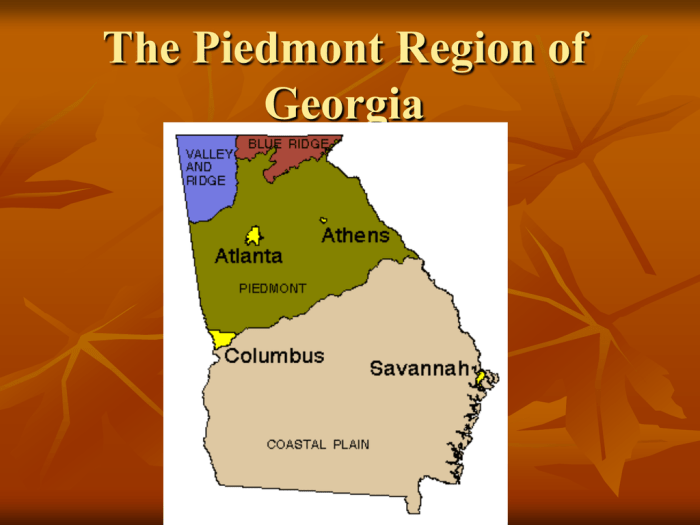Piedmont region of georgia economic contributions – The Piedmont region of Georgia stands as a testament to the transformative power of economic contributions, boasting a diverse and thriving economy that has shaped the state’s prosperity. From agriculture to manufacturing, tourism to healthcare, the region’s industries have played a pivotal role in driving economic growth and enhancing the quality of life for its residents.
The region’s agricultural sector serves as a cornerstone of the state’s economy, with vast tracts of land dedicated to crop production and livestock farming. Advanced agricultural technology and innovation have propelled the industry forward, resulting in increased productivity and exports.
Manufacturing and industry have also flourished in the Piedmont, with major companies establishing operations and contributing significantly to the regional and state GDP.
Economic Impact of Agriculture

The Piedmont region’s agricultural industry is a cornerstone of the state’s economy. It produces a wide range of crops, including cotton, soybeans, corn, and wheat, as well as livestock such as cattle, hogs, and poultry.
Crop Production
- The Piedmont region is a major producer of cotton, soybeans, and corn.
- In 2020, the region produced over 2 million bales of cotton, valued at $1 billion.
- Soybean production in the region exceeded 5 million bushels, generating $250 million in revenue.
Livestock Farming
- The Piedmont region is a significant producer of cattle, hogs, and poultry.
- In 2020, the region had over 1 million head of cattle, valued at $2 billion.
- Hog production in the region exceeded 500,000 head, generating $150 million in revenue.
Agricultural Exports
The Piedmont region exports a significant amount of its agricultural products to other states and countries.
- In 2020, the region exported over $1 billion worth of agricultural products.
- Major export markets include China, Mexico, and Canada.
Manufacturing and Industry

The Piedmont region is a hub for manufacturing and industry. Major industries operating in the region include textiles, chemicals, pharmaceuticals, and food processing.
Textiles
The Piedmont region has a long history of textile manufacturing. Today, the region is home to some of the largest textile manufacturers in the United States.
- The region produces a wide range of textile products, including yarn, fabric, and clothing.
- Textile manufacturing contributes over $5 billion to the regional economy.
Chemicals
The Piedmont region is also a major producer of chemicals. The region’s chemical industry is supported by a strong research and development infrastructure.
- The region produces a wide range of chemicals, including plastics, fertilizers, and pharmaceuticals.
- The chemical industry contributes over $4 billion to the regional economy.
Tourism and Hospitality
The Piedmont region is a popular tourist destination, with a rich history, beautiful scenery, and a vibrant culture.
Key Attractions
- The region is home to several historic sites, including the Martin Luther King Jr. National Historic Site and the Jimmy Carter National Historic Site.
- The region also boasts a number of natural attractions, including the Blue Ridge Mountains and the Chattahoochee River.
Economic Benefits
- Tourism generates over $10 billion in revenue for the Piedmont region.
- The industry supports over 100,000 jobs in the region.
- Tourism also contributes to the region’s tax base and investment.
Education and Workforce Development

The Piedmont region is home to a number of colleges and universities, as well as a strong network of workforce development programs.
Educational Institutions
- The region’s colleges and universities offer a wide range of programs, from associate degrees to doctoral degrees.
- Major universities in the region include the University of Georgia, Georgia Tech, and Emory University.
Workforce Development
The Piedmont region has a number of workforce development programs that help to train workers for the region’s industries.
- These programs offer training in a variety of fields, including manufacturing, healthcare, and information technology.
- Workforce development programs help to ensure that the region’s workforce has the skills needed to compete in the global economy.
Infrastructure and Transportation
The Piedmont region has a well-developed transportation infrastructure that supports its economic growth.
Highways
The region is served by a network of highways, including Interstate 85 and Interstate 20.
Railroads
The region is also served by a number of railroads, including the Norfolk Southern Railway and the CSX Transportation.
Airports, Piedmont region of georgia economic contributions
The region is served by a number of airports, including the Hartsfield-Jackson Atlanta International Airport.
Healthcare and Biotechnology: Piedmont Region Of Georgia Economic Contributions
The Piedmont region is a major center for healthcare and biotechnology.
Healthcare Companies
- The region is home to some of the largest healthcare companies in the United States, including Emory Healthcare and Piedmont Healthcare.
- These companies provide a wide range of healthcare services, from primary care to specialized care.
Biotechnology Companies
The region is also home to a number of biotechnology companies.
- These companies are developing new drugs and treatments for a variety of diseases.
- The biotechnology industry is contributing to the region’s economic growth and innovation.
Question Bank
What are the major agricultural products of the Piedmont region?
Cotton, soybeans, corn, wheat, and livestock are among the primary agricultural products.
How does tourism contribute to the Piedmont region’s economy?
Tourism generates revenue through job creation, tax income, and investment in local businesses.
What are the key economic development initiatives in the Piedmont region?
Initiatives focus on attracting new businesses, supporting existing industries, and enhancing infrastructure.